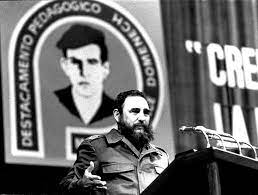
Havana ephemeris. July 20th.
1926. The labor leader Alfredo López is assassinated.

He became an outstanding union leader who fought for the unity and defense of the interests of the workers. He had to do with the founding in 1925 of the National Workers' Confederation of Cuba, which he defined as the ideal instrument to resist the repressive policy of the Machado tyranny. Precisely because of his prestige and the danger he posed for the dictatorial regime, he was the object of persecution. A few days before suffering the cunning attack and in the face of the threats he had received from a henchman in the service of the dictator who had told him that if he did not leave the unions "your head smells like gunpowder", he stated: "I cannot leave to the workers". And when his family and friends told him to be careful, he just said with a smile: "They can only kill me once."
On July 20, 1926, when he was walking down Gloria Street towards Zulueta in Havana, where the Workers' Center was, a henchman at the service of the dictatorship hit him on the head with an iron bar. Unconscious, they put him in a car and he was taken to the Atarés Castle where they threw him dying into a recently opened grave and finished him off with two large stones. It was not until several years later, after the destruction of the Machado dictatorship, that his remains could be recovered, which were found on August 24, 1933.
His birth took place in the town of Sagua La Grande, then province of Las Villas, on August 2, 1894.
1977. Commander in Chief Fidel Castro delivers a speech at the "Lázaro Peña" theater of the Cuban Workers Central, in Havana, at the graduation ceremony of the first contingent of students from the Manuel Ascunce Domenech pedagogical detachment.

It highlights the symbolism that these young people had completed their studies.
He states: “To understand the stimulating meaning of this graduation, it is necessary to remember the enormous obstacles that have been necessary to overcome in these years to reach the current encouraging situation of our education.
“We believe that no one can argue, in reality, that there is no country in Latin America —and we could include the rest of this hemisphere— that has achieved such high success in education as our country, without this —of course— leading us to to think that everything is going wonderfully, that we do not have any deficiencies, or things like that. But we could say that the successes achieved so far are the measure of what we will achieve in the future.”
Fidel recalled the critical situation that Cuba had in the sphere of education in 1959 when the victory of the Revolution took place.
He detailed: “Where do we start? What do we start from? From a country with 30% illiterate and 95% between illiterate and semi-illiterate. Some could read a little, and did not need to use a fingerprint to sign; but they had a 1st degree, a 2nd degree. A very high percentage of children —especially in the countryside, and also in the cities— lacked schools and teachers.”
He commented on the work carried out in the country first to eradicate illiteracy and then because the goal of sixth grade was reached and the improvement of various sectors of the people continued to be carried out.
Fidel also specified: “Because socialism is the first opportunity, really, for everyone to study, and for everyone to study without limits.”